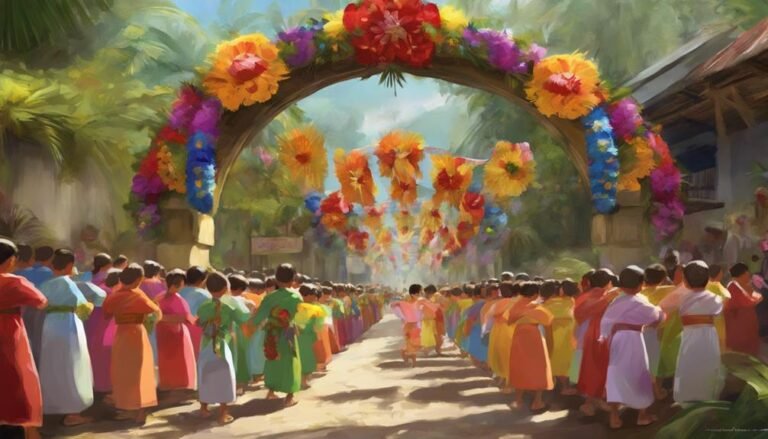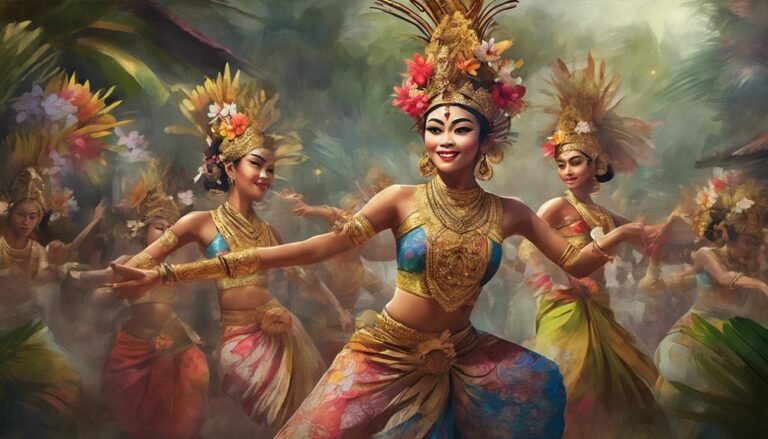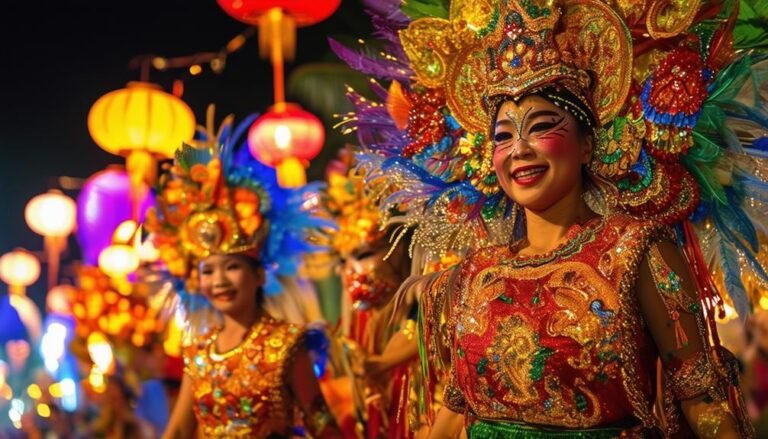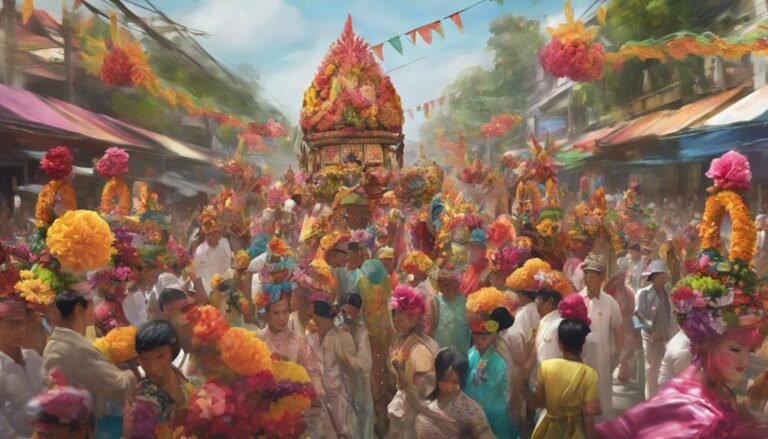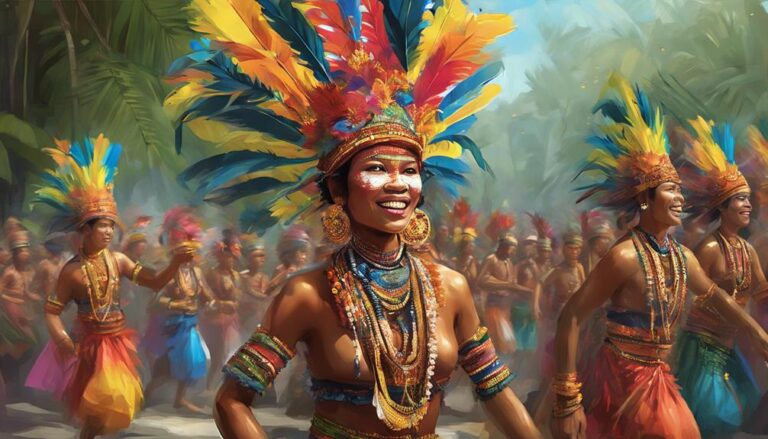Erau International Folk Art Festival Indonesia
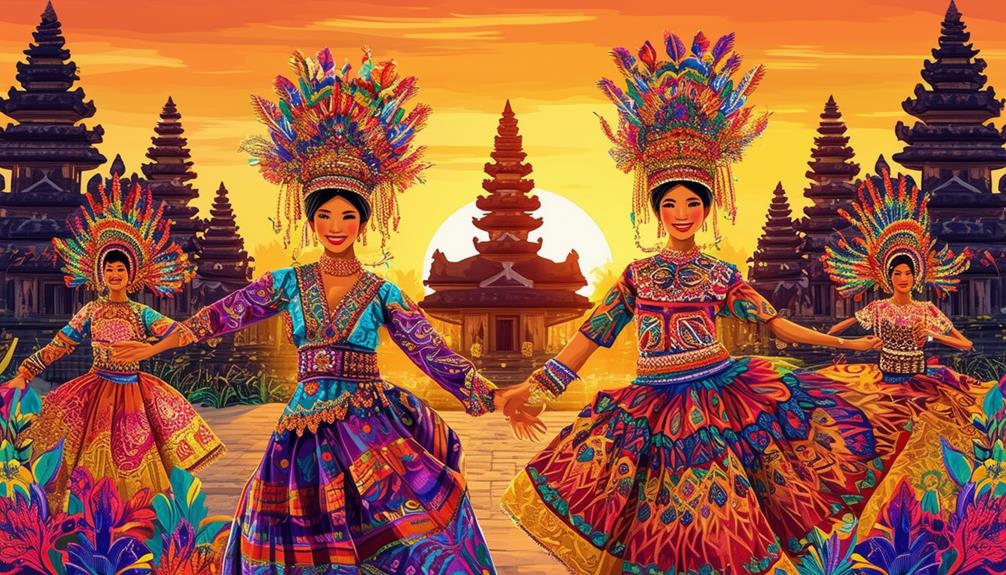
You're about to immerse yourself in Indonesia's rich cultural heritage at the Erau International Folk Art Festival, a 5-day celebration showcasing traditional music, dance, and handicrafts from over 20 countries. With over 500 artists and performers, this festival is a beacon of cultural revival and traditional art forms. You'll experience an immersive Indonesian culture, with activities like traditional music, dance, and craft exhibitions. As you explore this festival, you'll discover a hidden gem that's been promoting cultural diversity and exchange for over three decades – and there's still so much more to uncover.
Key Takeaways
• The Erau International Folk Art Festival celebrates Indonesia's rich cultural heritage through traditional music, dance, and handicrafts.
• The 5-day festival features over 500 artists and performers from 20+ countries, attracting 50,000+ visitors.
• The festival promotes cross-cultural understanding, showcases Indonesia's cultural diversity, and provides a platform for local artisans and cultural exchange.
• The event takes place in mid-July and offers an immersive experience in Indonesian culture, with traditional music, dance, craft exhibitions, and folk games.
• The festival originates from East Kalimantan's indigenous traditions, with a history dating back to the 1980s, and is a significant platform for cultural revival and traditional art forms.
What is Erau International Folk Art Festival and Why and When Erau International Folk Art Festival is celeberated
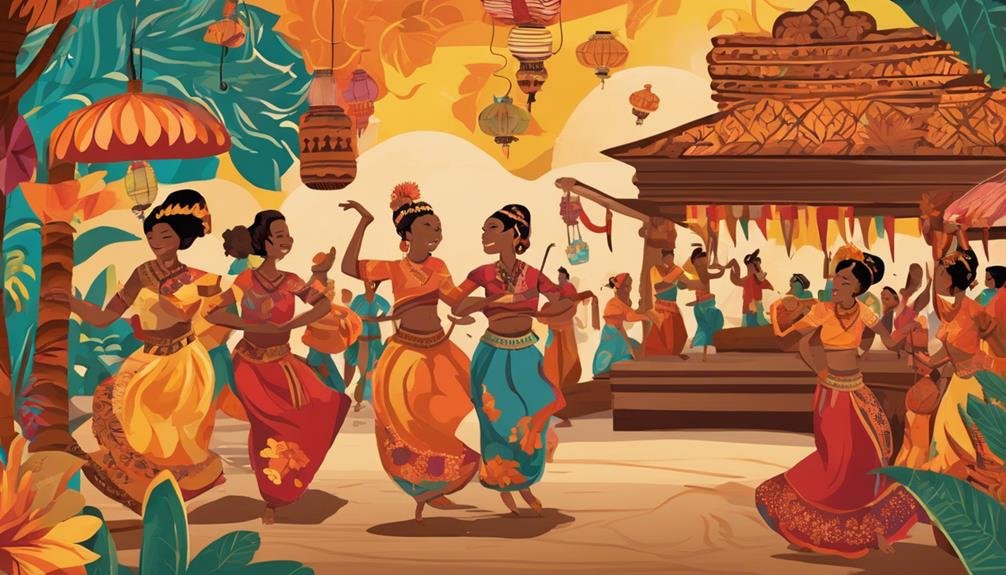
You're likely wondering what the Erau International Folk Art Festival is all about, and why this vibrant celebration has been a staple in Indonesia's cultural calendar. As you explore the world of Indonesian arts, you'll discover that this festival embodies the country's rich cultural heritage. The Erau International Folk Art Festival is a spectacle that weaves together traditional music, dance, and handicrafts, showcasing the nation's diverse artistic expression.
At its core, the festival celebrates the cultural significance of Indonesia's folk arts, which are deeply rooted in the country's history and traditions. It's an opportunity for local artisans to share their skills, passed down through generations, and for visitors to experience the authentic spirit of Indonesian culture. The festival's vibrant atmosphere is electric, with colorful costumes, lively performances, and intricate handicrafts on display.
As you wander through the festival grounds, you'll notice the emphasis on artistic expression, which is an essential aspect of Indonesian identity. The festival provides a platform for artists to showcase their talents, from traditional instrumental performances to mesmerizing dance routines. The Erau International Folk Art Festival is more than just a celebration – it's a preservation of cultural heritage, a celebration of artistic expression, and a tribute to the nation's creative spirit.
Facts AboutErau International Folk Art Festival
As you've experienced the vibrant atmosphere of the Erau International Folk Art Festival, you might be interested in learning more about this celebration, and here are some fascinating facts about this spectacular event.
One of the most striking aspects of the festival is its commitment to preserving and promoting Folk Art Evolution. This is evident in the diverse range of performances, exhibitions, and workshops that showcase traditional folk arts from around the world. The festival's emphasis on Cultural Diversity is also remarkable, with participants from over 20 countries coming together to share their unique cultural heritage.
| Fact | Description |
|---|---|
| Festival Duration | 5 days |
| Number of Participants | Over 500 artists and performers |
| Cultural Representations | 20+ countries |
| Festival Attendance | 50,000+ visitors |
The festival's focus on folk art and cultural exchange has made it a significant platform for artists, performers, and cultural practitioners to come together and learn from each other. The event has also contributed significantly to the local economy, generating revenue and creating jobs for the local community. With its rich cultural diversity and vibrant atmosphere, the Erau International Folk Art Festival is an event that truly celebrates the beauty of cultural diversity.
Why Erau International Folk Art Festival Is Celeberated
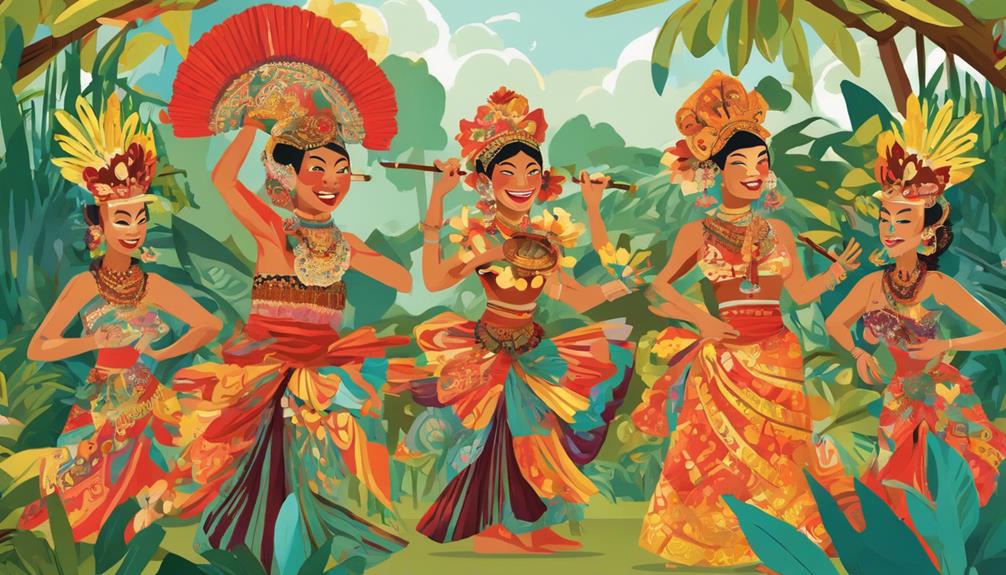
The Erau International Folk Art Festival is celebrated to promote cross-cultural understanding, exchange, and appreciation, ultimately enriching the global cultural landscape. As you explore the essence of this festival, you'll find that it's a vibrant celebration of folk art, music, and dance, showcasing the rich cultural heritage of Indonesia. The festival serves as a platform for artists, performers, and artisans to share their unique perspectives, sparking a sense of wonder and curiosity among attendees.
You'll notice that the Erau International Folk Art Festival is a beacon of cultural revival, breathing new life into traditional art forms and inspiring a new generation of artists. It's an opportunity for you to immerse yourself in the vibrant sounds, colors, and rhythms of Indonesian folk culture, and to experience the country's rich cultural diversity firsthand. The festival's emphasis on folk art inspiration encourages cross-cultural exchange, allowing you to engage with artisans, musicians, and performers from diverse backgrounds, and to gain a deeper understanding of the cultural nuances that shape their work.
As you explore the festival, you'll start to appreciate the significance of cultural revival in preserving traditional art forms and promoting intercultural understanding. By celebrating the Erau International Folk Art Festival, you're contributing to the preservation of Indonesia's rich cultural heritage, and helping to foster a more inclusive, culturally aware global community.
Etymology of Erau International Folk Art FestivalIndonesia
In exploring the origins of the Erau International Folk Art Festival, it's intriguing to uncover the roots of its name, which reflects the rich cultural heritage of Indonesia. As you investigate the origins of Erau, you'll find that the name is deeply rooted in Indonesian folklore. The term 'Erau' is derived from the Dayak language, spoken by the indigenous people of Kalimantan, Indonesian Borneo. In Dayak culture, 'Erau' refers to a traditional celebration that brings together the community to share stories, dance, and make music.
The significance of Erau lies in its ability to preserve and promote the cultural traditions of Indonesia's diverse ethnic groups. By embracing the Erau traditions, the festival celebrates the country's rich cultural heritage, which is deeply rooted in folklore. The name 'Erau' is a nod to the folklore significance of the festival, which aims to preserve and promote the cultural traditions of Indonesia's diverse ethnic groups.
As you explore further into the festival's name, you'll uncover the intricate web of cultural significance that underlies the Erau International Folk Art Festival. The name is more than just a label; it's a reflection of the festival's commitment to celebrating Indonesia's vibrant cultural heritage.
History of Erau International Folk Art FestivalIndonesia
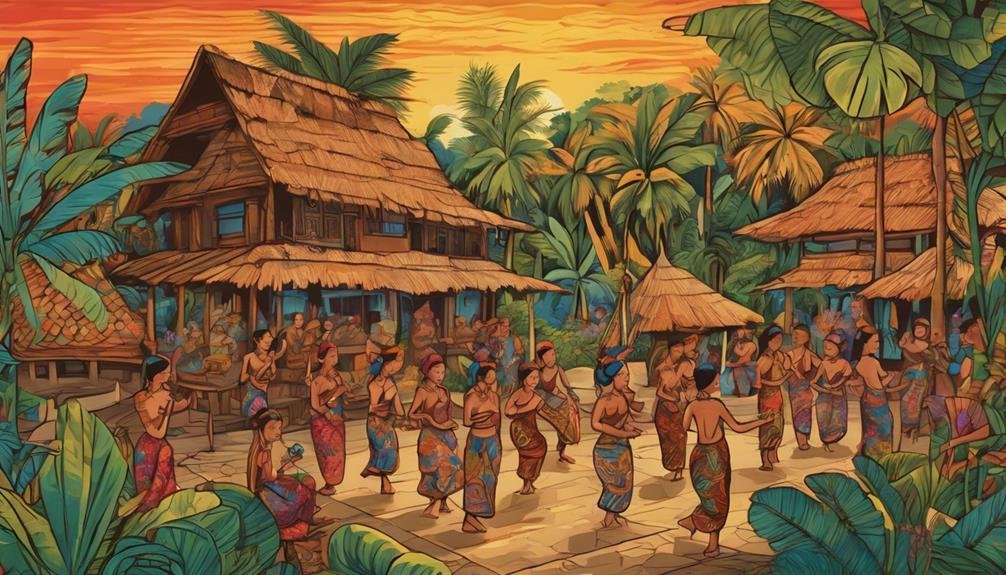
As you explore the History of Erau International Folk Art Festival Indonesia, you'll discover that the festival's origins are rooted in the country's rich cultural heritage.
You'll find that the folk art roots of the festival stem from the traditional practices and customs of the Indonesian people.
Festival Origins
By delving into the rich cultural heritage of East Kalimantan, you'll discover that the Erau International Folk Art Festival's history is deeply rooted in the indigenous traditions of the region.
The festival's origins can be traced back to the folk art revival of the 1990s, which aimed to preserve and promote the cultural identity of East Kalimantan's indigenous communities. This revival was a response to the growing concern that the region's unique cultural heritage was slowly disappearing.
As a result, local artists, craftsmen, and musicians came together to revive and showcase their traditional folk art forms, such as woodcarvings, textiles, and music. The festival was born out of this collective effort, providing a platform for the communities to share their cultural identity with the world.
Today, the Erau International Folk Art Festival continues to celebrate the rich cultural diversity of East Kalimantan, fostering a sense of pride and ownership among the local communities.
Folk Art Roots
You'll find that the Erau International Folk Art Festival's origins go deeper into East Kalimantan's cultural heritage, where indigenous traditions and folk art forms have been intertwined for centuries. The region's rich cultural significance is reflected in its diverse artistic expressions, which are deeply rooted in the customs and beliefs of its indigenous people. As you explore the festival's history, you'll discover that it's built upon a strong foundation of folk art, which has been passed down through generations.
The intricate patterns, vibrant colors, and symbolic motifs that characterize East Kalimantan's folk art are more than just aesthetically pleasing; they hold significant cultural meaning. Each artistic expression, whether it's a traditional dance, music, or craft, tells a story about the region's history, mythology, and values. The Erau International Folk Art Festival celebrates and preserves this cultural heritage, providing a platform for artisans to showcase their skills and share their cultural traditions with the world.
Cultural Exchange Beginnings
The Erau International Folk Art Festival's history began to take shape in the 1980s when Indonesia's government launched a series of initiatives aimed at promoting cultural exchange between East Kalimantan's indigenous communities and the global community.
This cultural revival was long overdue as the region's rich artistic heritage was in danger of being lost. The government's efforts sparked a renewed interest in traditional folk art, and you could feel the excitement building. As local artisans began to share their skills with international artists, a beautiful cultural exchange took place.
This exchange not only preserved the region's cultural identity but also amplified the artistic voices of the indigenous communities. The festival became a platform for these voices to be heard, and you could sense the pride and ownership among the locals.
As the festival grew, it attracted visitors from around the world, further solidifying its role in promoting cross-cultural understanding and appreciation.
What Are The Dates Erau International Folk Art FestivalIndonesia Takes Place
As you plan your trip to Indonesia, keep in mind that the Erau International Folk Art Festival typically takes place over a week in mid-July. This timing is perfect for experiencing the rich cultural heritage of Indonesia, as the festival showcases the country's diverse folk arts.
To help you plan, here is a rough outline of the festival schedule:
| Year | Dates |
|---|---|
| 2022 | July 15-22 |
| 2023 | July 10-17 |
| 2024 | July 12-19 |
| 2025 | July 14-21 |
| 2026 | July 11-18 |
During the festival, you can immerse yourself in Indonesian culture through folk dance performances, cultural immersion experiences, and traditional craft workshops. You'll have the opportunity to learn about the country's rich cultural heritage and interact with local artisans and performers.
Keep in mind that the exact dates may vary from year to year, so be sure to check the official festival website for the most up-to-date information. With a little planning, you can experience the vibrant culture of Indonesia and make unforgettable memories at the Erau International Folk Art Festival.
Main Activities & Events in Erau International Folk Art FestivalIndonesia
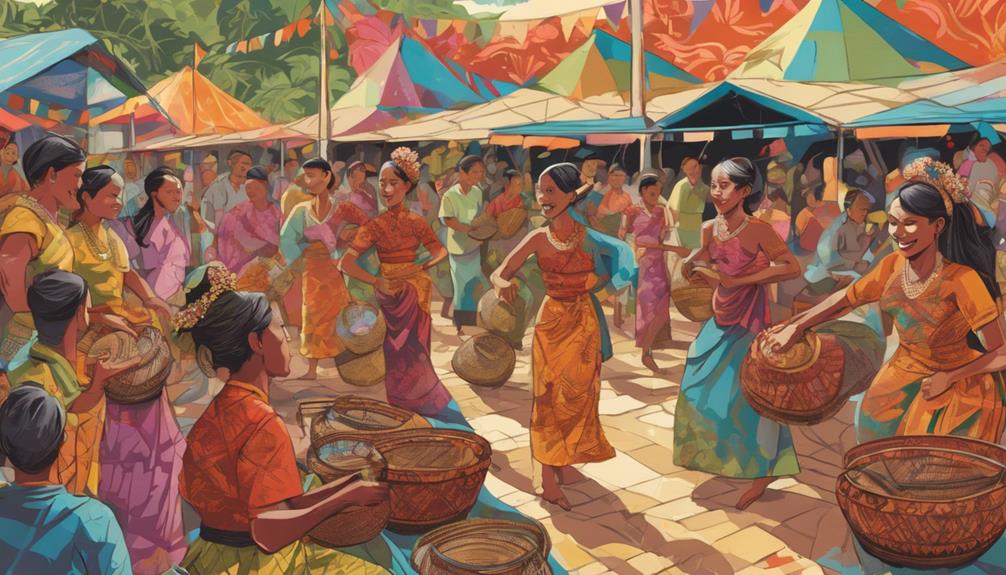
As you explore the Erau International Folk Art Festival Indonesia, you'll discover a range of activities and events that showcase the country's rich cultural heritage.
The festival features a diverse program, including:
- traditional music and dance performances,
- craft exhibitions and workshops, and
- folk games and competitions.
These events offer a unique glimpse into Indonesia's vibrant folk art scene.
Related Festivals In The Same Region
During your exploration of Indonesia's vibrant cultural landscape, you'll discover that the Erau International Folk Art Festival shares a rich heritage with several other festivals in the region. These Southeast Asian celebrations showcase the diversity and richness of the region's cultural traditions.
| Festival | Location | Description |
|---|---|---|
| Galungan Festival | Bali | Celebrates the victory of dharma over adharma with processions and traditional dances |
| Makassar International Writers Festival | Makassar | Showcases literary works and promotes cultural exchange |
| Java Jazz Festival | Jakarta | Features jazz performances and workshops |
| Baliem Valley Festival | Papua | Highlights the cultural heritage of the Dani, Lani, and Yali tribes |
| Jakarta Fair | Jakarta | Exhibits Indonesian products, food, and cultural performances |
These cultural festivals not only reflect the region's cultural diversity but also foster a sense of community and cultural exchange. By attending these festivals, you'll gain a deeper understanding of the region's rich cultural heritage and its significance in modern Indonesian society.
Interesting Less Known Facts About Erau International Folk Art FestivalIndonesia
You'll likely be surprised to learn that the Erau International Folk Art Festival in Indonesia has been showcasing traditional performing arts from across the globe for over three decades, yet remains relatively under the radar. Despite its rich history, the festival still flies under the radar, making it a hidden gem for those who stumble upon it.
Here are three interesting facts about the festival:
- Festival Fashion: The festival is a treasure trove of traditional attire from around the world. You'll spot intricately designed batik garments from Indonesia, vibrant kimonos from Japan, and colorful saris from India, making it a fashion enthusiast's paradise.
- Cultural Diversity: With participants from over 20 countries, the festival is a melting pot of cultures. You'll witness a beautiful blend of traditional dances, music, and theater performances that showcase the diversity of global art forms.
- Community Engagement: The festival goes beyond just performances, engaging with the local community through workshops, classes, and interactive sessions. This fosters a sense of community and promotes cross-cultural understanding.
| Year | Number of Participants | Countries Represented |
|---|---|---|
| 2015 | 500 | 15 |
| 2018 | 700 | 18 |
| 2020 | 900 | 22 |
| 2022 | 1000 | 25 |
| 2025 (Projected) | 1200 | 28 |
The festival's growth in recent years is a sign of its increasing popularity, and with its unique blend of cultural diversity and community engagement, it's no wonder it's becoming a hot spot for cultural enthusiasts.
Tips for attending the Erau International Folk Art FestivalIndonesia
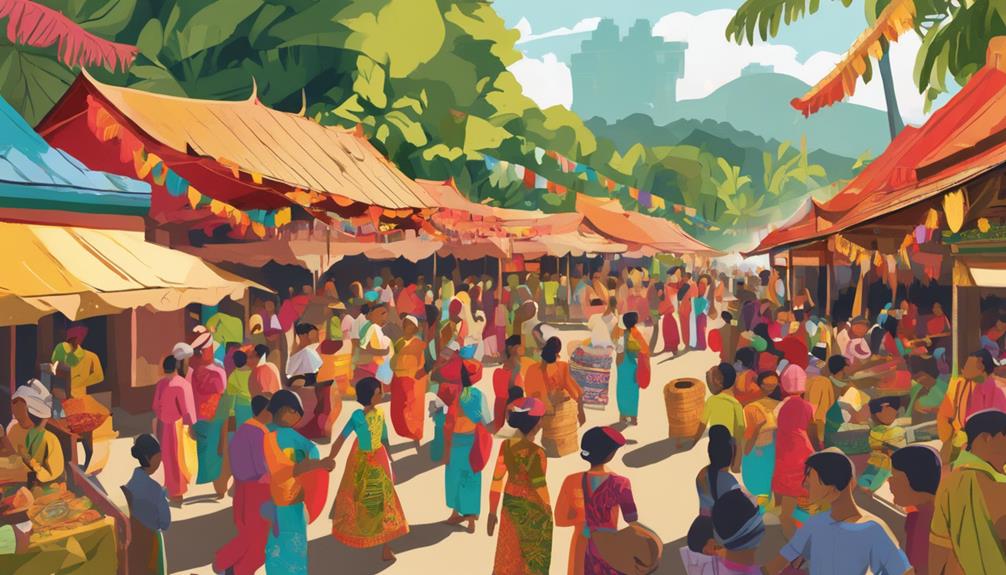
As you prepare to attend the Erau International Folk Art Festival, it's essential to plan ahead. You'll want to figure out how to reach the festival grounds, whether that's by car, bus, or on foot.
Additionally, checking the weather forecast beforehand will help you pack accordingly and make the most of your experience.
How To Reach Erau International Folk Art Festival
Reaching the Erau International Folk Art Festival in Tenggarong, East Kalimantan, demands some planning, but with the right information, you'll be able to navigate the journey with ease.
To guarantee a smooth trip, prioritize festival preparation and cultural immersion. Research the festival's schedule, highlights, and cultural significance to maximize your experience.
Here are some essential travel tips to get you started:
- Fly into Sepinggan International Airport: Located in Balikpapan, it's the nearest airport to Tenggarong. From there, take a taxi or rent a car for a 2.5-hour drive to Tenggarong.
- Book your accommodation in advance: Tenggarong has limited options, so secure a hotel or homestay near the festival venue to avoid last-minute scrambles.
- Plan your itinerary: Allocate time for exploring Tenggarong's cultural attractions, such as the Kutai Sultanate Museum, and soaking up the vibrant atmosphere of the festival.
Weather In Erau International Folk Art Festival
During the Erau International Folk Art Festival, which typically takes place in July, you're likely to experience a tropical rainforest climate with high humidity and temperatures ranging from 20 to 30 degrees Celsius. As you prepare for the festival, it's essential to pack accordingly. You'll want to bring lightweight, breathable clothing that will keep you cool and comfortable while watching the vibrant folk dance performances or trying out traditional instruments.
| Month | Average Temperature (°C) | Precipitation (mm) |
|---|---|---|
| July | 25-30 | 150-200 |
| August | 24-29 | 120-180 |
| September | 23-28 | 100-150 |
To make the most of your experience, consider bringing a lightweight rain jacket or poncho, as sudden rain showers are common during this time of year. Additionally, don't forget to pack a spare set of clothes, in case your folk dance costumes get wet. With the right attire and mindset, you'll be ready to immerse yourself in the rich cultural heritage of Indonesia at the Erau International Folk Art Festival.
Famous Landmarks To Visit When VisitingIndonesia
With over 17,000 islands to explore, you'll want to prioritize visiting Indonesia's most iconic landmarks, such as the magnificent Borobudur Temple in Magelang, Central Java. This majestic temple, a UNESCO World Heritage Site, is a marvel of Buddhist architecture, showcasing intricate carvings and statues of Buddha.
When visiting Indonesia, you should also consider exploring these famous landmarks:
- Prambanan Temple: Located in Yogyakarta, this stunning Hindu temple complex is known for its exquisite architecture and beautiful carvings, making it a must-visit destination for history buffs and cultural enthusiasts.
- Monas National Monument: Situated in Jakarta, this iconic monument symbolizes Indonesia's struggle for independence and offers panoramic views of the city from its observation deck.
- Lake Toba: As the largest lake in Southeast Asia, Lake Toba in North Sumatra is a breathtaking natural wonder, surrounded by lush green hills and picturesque villages.
These landmarks not only showcase Indonesia's rich cultural heritage but also offer a glimpse into its stunning natural beauty. By visiting these iconic attractions, you'll gain a deeper understanding of Indonesia's history, culture, and natural wonders.
Famous Foods FromErau International Folk Art Festival
As you wander through the vibrant streets of the Erau International Folk Art Festival, the aromas of traditional Indonesian cuisine will tantalize your taste buds, beckoning you to sample the rich flavors of the region. The festival offers a culinary journey through the country's diverse local delicacies, carefully prepared by skilled street vendors who've perfected their recipes over generations.
Be sure to try these must-try dishes:
- Gudeg: A traditional dish from Yogyakarta, made from young jackfruit, coconut milk, and spices, served with steamed rice and boiled egg.
- Soto: A hearty soup originating from East Java, made with broth, meat (usually beef or chicken), and vegetables, served with steamed rice or noodles.
- Martabak: A stuffed pancake with savory fillings such as eggs, minced meat, and onions, often served with a sweet soy sauce.
As you explore the festival, you'll discover more local specialties, each with its unique flavor profile and story to tell. From spicy sambals to sweet desserts, every bite is a tribute to Indonesia's rich culinary heritage. Don't be afraid to ask the friendly street vendors about their recipes and cooking techniques – they're more than happy to share their passion for food with you.
Frequently Asked QuestionsErau International Folk Art Festival
You may have some questions about the Erau International Folk Art Festival, and we're here to help – what's the festival's schedule, what kind of activities can I expect, and are there any accommodations available for out-of-town visitors?
The festival's schedule typically spans over a week, with each day featuring a unique lineup of performances, workshops, and exhibitions. You can expect to see vibrant folk dance performances, showcasing intricate costumes and traditional attire from various cultures. The festival also offers hands-on workshops, where you can learn traditional crafts, music, and dance from experienced artists.
In terms of accommodations, there are several options available for out-of-town visitors. The festival organizers have partnered with local hotels to offer discounted rates for attendees. Additionally, there are also camping options available for those who want to immerse themselves in the festival atmosphere.
One of the unique aspects of the Erau International Folk Art Festival is its focus on artistic collaborations. You'll have the opportunity to see artists from different cultural backgrounds come together to create new and innovative performances. These collaborations often result in a unique fusion of traditional and modern styles, making for a truly unforgettable experience.
Frequently Asked Questions
Can I Bring My Pet to the Festival?
You're wondering if you can bring your pet to the festival, but first, consider if your pet has a Pet Pass or is a certified Service Animal, as only they're typically allowed in public events.
Are There ATMS Available at the Festival Site?
You'll likely need cash for festival expenses, but don't worry, you'll find ATMs on site; still, consider using cashless options to make purchases, as some vendors might not accept your festival currency.
Is Wi-Fi Available Throughout the Festival Area?
As you navigate the festival area, you'll find Wi-Fi available throughout, although signal strength may vary; plan ahead, using offline maps for festival navigation to make sure you don't get lost in the cultural chaos.
Can I Leave and Re-Enter the Festival Grounds?
You're wondering if you can leave and re-enter the festival grounds; thankfully, yes, re-entry is allowed, but be aware that Gate Closures might occur, so plan accordingly to avoid missing your favorite performances.
Are There Any Age Restrictions for Festival Attendees?
When attending festivals, you might wonder if there are age restrictions; fortunately, most events welcome all ages, offering varying levels of festival accessibility and sometimes even childcare options, ensuring a fun experience for everyone.
Conclusion
As you reflect on your experience at the Erau International Folk Art Festival, you'll realize that it's more than just a celebration of cultural heritage. It's a tribute to the power of art and community, bringing together people from diverse backgrounds to appreciate the beauty of traditional music, dance, and craft.
Take with you the memories of vibrant performances, colorful costumes, and warm smiles, and let the essence of Erau linger long after you've left Indonesia's shores.

